- Home
- Michelle Richmond
Golden State
Golden State Read online
Praise for Golden State
“I haven’t read such a gripping, bittersweet, moving novel in ages. Golden State sweeps you up, whisks you away, and doesn’t let you go till the very end. Michelle Richmond, author of the unforgettable The Year of Fog, does it again, and all I can say is merci.”
—TATIANA DE ROSNAY, New York Times bestselling author of Sarah’s Key, A Secret Kept, and The House I Loved
“Beautifully written, Golden State is a tender portrait of loss, marriage, and sisterhood, all set against a gripping backdrop sure to keep readers’ hearts in their throats as the story unfolds.”
—CATHY MARIE BUCHANAN, New York Times bestselling author of The Painted Girls
“In this complex, riveting tale set in a California on the verge of secession, Michelle Richmond manages to find the humanity among the chaos, beautifully concentrating on the ties that bind, not on the ones that are being severed.”
—MELANIE BENJAMIN, New York Times bestselling author of The Aviator’s Wife
“Michelle Richmond is a writer of rare vision and grace, and Golden State is her best book yet. I couldn’t put it down.”
—JOSHILYN JACKSON, New York Times bestselling author of A Grown-Up Kind of Pretty
“Michelle Richmond slices to the heart of love in its many permutations: romantic, sororal, and, most of all, maternal. I was swept up by this lovely, poignant novel, my sadness at its end only mitigated by my pleasure at having experienced its many gifts.”
—AYELET WALDMAN, author of Red Hook Road
“A fierce and luminous story about love, loss, family, and forgiveness.”
—CARLA BUCKLEY, author of The Deepest Secret
“A powerful, riveting, and heartfelt novel, an ode to San Francisco and to the fierceness of the human spirit.”
—ELLEN SUSSMAN, author of French Lessons and The Paradise Guest House
Golden State is a work of fiction. Names, characters, places, and incidents either are the products of the author’s imagination or are used fictitiously. Any resemblance to actual persons, living or dead, events, or locales is entirely coincidental.
A Bantam Books eBook Edition
Copyright © 2014 by Michelle Richmond Reading group guide copyright © 2014 by Random House LLC
All rights reserved.
Published in the United States by Bantam Books, an imprint of Random House, a division of Random House LLC, a Penguin Random House Company, New York.
BANTAM BOOKS and the HOUSE colophon are registered trademarks of Random House LLC.
RANDOM HOUSE READER’S CIRCLE & Design is a registered trademark of Random House LLC.
Grateful acknowledgment is made to the following for permission to reprint previously published material:
STEVE FORBERT C/O BLIND AMBITION MANAGEMENT: Excerpt from “Goin’ Down to Laurel” by Steve Forbert. Reprinted by permission.
CHRIS ISAAK C/O JAMIE YOUNG: Excerpt from “San Francisco Days” by Chris Isaak. Reprinted by permission.
JOSH ROUSE C/O ANHEDONIA MANAGEMENT: Excerpt from “Sweetie” by Josh Rouse. Reprinted by permission.
LIBRARY OF CONGRESS CATALOGING-IN-PUBLICATION DATA
Richmond, Michelle.
Golden state : a novel / Michelle Richmond.
page cm.
ISBN 978-0-385-34328-2
eBook ISBN 978-0-345-53240-4
1. Women physicians—Fiction. 2. Sisters—Fiction.
3. Man-woman relationships—Fiction. 4. Domestic fiction. I. Title.
PS3618.I35G65 2013
813′.6—dc23
2013015427
www.randomhousereaderscircle.com
Title-page image: © iStockphoto.com
Cover design: Belina Huey
Cover images: © Michael Menefee (birds),
© Sapna Reddy/Getty Images (bridge),
© Brian Cronin (flowers)
v3.1_r1
Contents
Cover
Title Page
Copyright
Epigraph
Prologue
Chapter 1
Chapter 2
Chapter 3
Chapter 4
Chapter 5
Chapter 6
Chapter 7
Chapter 8
Chapter 9
Chapter 10
Chapter 11
Chapter 12
Chapter 13
Chapter 14
Chapter 15
Chapter 16
Chapter 17
Chapter 18
Chapter 19
Chapter 20
Chapter 21
Chapter 22
Chapter 23
Chapter 24
Chapter 25
Chapter 26
Chapter 27
Chapter 28
Chapter 29
Chapter 30
Chapter 31
Chapter 32
Chapter 33
Chapter 34
Chapter 35
Chapter 36
Chapter 37
Chapter 38
Chapter 39
Chapter 40
Chapter 41
Chapter 42
Chapter 43
Chapter 44
Chapter 45
Chapter 46
Chapter 47
Chapter 48
Chapter 49
Chapter 50
Chapter 51
Chapter 52
Chapter 53
Chapter 54
Chapter 55
Dedication
Acknowledgments
Other Books by This Author
About the Author
A Reader’s Guide
Where is Nirvana?
Nirvana is here, nine times out of ten.
—Hồ XUN HU’O’NG,
“Spring-Watching Pavilion”
PROLOGUE
Tell me a story, he said.
So I told him about my first morning in San Francisco. It was July, summer in the city, foggy and cold. I was tired and jet-lagged and had yet to unpack, but I wanted to see the famous California coast. I took a bus over the Golden Gate Bridge to San Rafael, where I boarded a shuttle to Point Reyes.
Alone, I wandered along the cliffs in the freezing fog, out to the lighthouse. I stood gazing at the roaring Pacific, a crazy-looking ocean, infinitely more dangerous and dramatic than the Gulf Coast waters I knew so well. On a small hill above a meadow, I followed a picket fence for several hundred yards, curious where it led. And then, without warning, the fence abruptly ended. A narrow ditch split the ground in two; on the other side, the fence continued on its way.
A middle-aged man stood with a boy of about seven. The man was on one side of the ditch, the boy on the other. They held hands across the divide. “We’re on top of the San Andreas Fault,” the man explained to the child. “This used to be one long, straight fence. When the earthquake hit in 1906, it broke the fence in half and moved it sixteen feet.”
I imagined the earth moving in one swift, startling motion, rearranging everything in an instant. Battling a sudden feeling of vertigo, I placed a hand on the fence to steady myself. What was I doing here? California might as well have been another country. Back home, we had hurricanes and tornadoes, thunderstorms so violent they shook the house to its very bones. But this was different.
1
12:41 p.m., June 15
The reception area of the tiny hotel is eerily empty. On the desk, a coffee mug smeared with red lipstick sits beside a small television, the volume turned up high, blaring news of the vote. Eleanor’s mug, Eleanor’s lipstick. Famously difficult Eleanor.
I leave my crutches behind and use the rail to pull myself up the stairs. At the top, I turn left. The first room is empty, the door op
en to reveal two twin beds, an old dresser, blood on the floor.
I continue along the hallway. The second door is closed. Room 2B. Heather’s room. Early this morning, while I was still sleeping on the couch of a radio station at the other end of the city, my phone began to vibrate. It was Heather, texting: It’s time. It seems like a lifetime ago.
“Heather?”
I try the knob, but it doesn’t budge.
“Heather?”
I knock. Again, no answer.
Finally, a scraping sound, furniture moving across the floor. The knob turns, the door opens a few inches, and there she is—red in the face, her T-shirt drenched with sweat, her eyes strangely calm. Her gaze takes in my wrecked face, my filthy clothes, the hastily wrapped bandage on my foot.
I squeeze through the doorway. On the opposite wall, a bureau is shoved against a tall window that opens onto a balcony. To my left, as far as possible from the window, stands the bed, the sheets twisted and wet.
“When I saw him coming toward the hotel,” she tells me, “I barricaded the door. When he left, I barricaded the window.”
She shuts the door behind me, then locks it. Together we shove the desk back into place.
“What happened next door?”
“He had Eleanor,” she says. “Sounded bad.”
Heather doubles over in pain, moaning. I limp to her side. She grips my arm so tight I can feel her fingernails through my sweater. Seconds pass before her face relaxes. She catches her breath, lowers herself onto the bed. “What’s the difference between a pregnant woman and a lightbulb?” she asks.
“Got me.”
“You can unscrew a lightbulb.”
I smile, happy to see the Heather I know.
In the bathroom, I wash my face and hands. I smell terrible and look worse. The skin under my arms is bleeding, rubbed raw from the crutches. Rummaging through Heather’s cosmetics bag, I am grateful for the small miracle of a rubber band. I gather my hair into a ponytail, drink cold water from the faucet, and rinse my mouth with toothpaste.
I scan the bathroom for anything useful. There’s a small bar of soap, two towels hanging beside the stained tub, an empty waste bin beneath the sink. I grab the towels and bin and hobble into the darkened room. I drag a chair up to the end of the bed and drape a blanket over Heather’s knees.
“Are there any cops out there?” she asks.
“Just one terrified kid.”
She clutches the sheets as another contraction seizes her. Her face registers the pain, but she is silent. Thirty seconds pass before she collapses back onto the pillow, panting.
“Where’s the National Guard?” she asks.
“Sacramento and L.A., I guess.”
A foghorn wails in the distance—that familiar, soothing sound. “Scoot down,” I say. “Here comes the fun part.”
“When I said I didn’t need the bells and whistles, I didn’t quite picture it like this.” She moves toward the end of the bed.
“The baby’s going to be fine,” I say, mustering my calmest voice.
I lift the blanket to examine her. I’m not an ob-gyn, I’m a general internist. This is not what I do. Of course, I did it during my residency years—a month on the maternity ward at San Francisco General—but I was relieved beyond measure when my time was over.
Just to the west of us, beyond the barricaded window and the empty parking lot, is the Veterans Administration hospital. The six-unit hotel is normally booked with veterans’ families, waiting out heart surgery and organ transplants, but today the place is deserted. All but the most crucial surgeries have been postponed, and the whole campus is running on a bare-bones staff.
Both of us are startled by the footsteps on the stairs. Our eyes lock.
A knock on the door. I open my mouth to answer, but Heather brings a finger to her lips.
The knock again, more insistent this time.
“Dr. Walker?” I recognize the voice—Greg Watts from security. Relief washes over me. I shove the desk away from the door just enough to let him in. At sixty going on forty-five, Greg has the slim, athletic build of a runner. He looks me over quickly, grimacing.
“You okay, Dr. Walker?”
“Fine.”
He glances at Heather. “What about her?”
“We’re managing. It would be great if we could get a nurse and supplies.”
“Nobody wants to cross that parking lot,” he says. “Not after Eleanor. Not after he shot at you.”
“You crossed the parking lot.”
Greg holds up a cellphone. The blue Mute light is flashing. “Special delivery. He wasn’t going to shoot his own messenger.”
I look at the phone, uncomprehending. “What?”
“He wants to talk to you.”
“Shit.”
“He says if he can’t talk to you, someone’s going to get hurt.”
“Where is he now?”
“He broke into your office.”
I take a shaky breath. My office. I think of the photos on the desk, the art on the walls, the radios from Tom, the sand dollar from an afternoon on the beach with Ethan. If he wanted to get inside my head, he’s done it.
“Anyone else?”
“Betty Chen.”
Betty’s worked ICU for twenty-six years. A nice woman, a gifted nurse, very calm, four kids and eleven grandkids spread out all over the country. Every year, she and her husband travel by RV to Florida, New Jersey, Ohio, and Montana to see all of them.
“Better staff than patients.”
Greg shakes his head. There’s something he doesn’t want to tell me. “He’s got Rajiv.”
My heart sinks. Twenty-seven years old, in his final year of residency, Rajiv is my chief resident and my favorite student. In a couple of months, he’s getting married. I’ve been looking forward to the wedding.
I press the Mute button and take a deep breath.
“Hello?”
“So,” a familiar voice says, “I finally got your attention.”
2
6:27 a.m., June 15
For several moments everything seems normal—the smell of bacon from Lee’s, the streetlamps on Spear Street, the damp air against my skin. Then a plume of smoke to the west catches my eye. A fire. I try to calculate the distance from here to there, try to draw a map in my mind.
A curb—such an ordinary thing: five inches from sidewalk to street. I’ve stepped off this particular curb into this particular street hundreds of times, and yet today, in my distraction, I misjudge its location. My right foot comes down hard, twisting inward. A snapping sound. A jolt of pain from ankle to knee.
I move quickly, counting steps to distract myself from the pain: a full step on the left foot, a half step on the right. Suddenly, my run-down Jeep Cherokee, the one I can’t bring myself to get rid of, seems like a luxury. Once I get to the Jeep, everything will be fine. It’s only seven miles across the city, from one end to the other. Seven miles to Heather, who texted me minutes ago: It’s time.
Customers are already seated at the counter of the deli. Lee’s usually doesn’t get busy until later, but on this day, people want to be together. The door is open, the small television above the cash register is tuned to CNN, and CNN is tuned to California.
I limp down Spear Street, across Folsom, grateful for the sun glinting off the tall glassy buildings, the briny smell drifting in from the bay, the rumble of traffic moving over the bridge. How many times have I walked these two blocks at precisely this time of morning? In the first year of our marriage, I did it once or twice a week, after spending the night at the radio station with Tom, keeping him company before my own workday began. He stowed a blanket and pillow in the closet for just this purpose, and I would fall asleep on the couch, the sound of his voice a pleasing background music to my dreams. Later, there were the years with Ethan, when the station was the furthest thing from my mind. In those days, I would tuck Ethan into bed, lie down beside him until he fell asleep, then curl up on the sofa with a book
or, more often, a medical journal, listening for the sweet, miraculous sound of his breathing. Those nearly perfect years, when we felt, so briefly, like a family.
Up ahead, the Jeep comes into view. Just one more block, and I can rest my ankle. I’ve sprained it before—last year, in fact, running a half-marathon—but this is different. The snapping sound, the feel of something ripping beneath the skin. A level 3 sprain, at least; more likely, it’s fractured. The initial treatment is simple, straightforward, one of those medical school basics you never forget: RICE—rest, ice, compression, elevation. But there’s no time now.
As I hobble forward, I imagine how my ankle would look in an X ray: the ligaments stretched and torn, blood from the ruptured vessels spilling into the surrounding tissues. Visualizing the X ray gives me comfort—a point of reference, a matter of perspective. Every pain has its cause. That’s what I tell my patients when a diagnosis is elusive. For most, it comes as welcome reassurance: something specific is making them suffer, and I will do my best to find it.
Later, at the VA hospital, after all is said and done with Heather, I’ll have one of my colleagues set the foot. There will be a cast or boot, the awkward fact of crutches. Any other day, I’d take something strong to reduce the swelling and dull the pain, but today, Tylenol will have to do. I don’t want anything to blur my mind or blunt my senses. I want to be fully present, absolutely alert, for the task at hand.
The drive should be a straight shot down California Street. Normally, it would take half an hour, tops. Now there’s no telling. The most unsettling part of all of this is the uncertainty. At this time tomorrow, where will we be? I mean this in the broadest sense: not just my husband, my sister, me, but also our state, our country.
A thundering racket fills the air. It’s a helicopter, wobbling overhead like some big, clumsy bird. A white bundle drops. My breath catches; a baby is falling from the sky. But then the bundle breaks apart, and the sky is aflutter with something white and snowlike. The chopper shifts; a second bundle drops. The helicopter moves inland in its jerky, graceless way. One of the snowflakes drifts down and settles at my feet. A rectangular piece of white paper, printed with the image of the California flag. Beneath the flag, a slogan is printed in thick red letters: VOTE YES FOR SUCCESS!

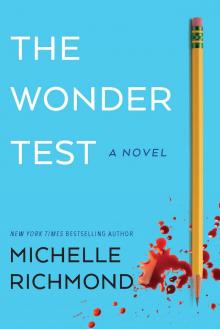 The Wonder Test
The Wonder Test The Year of Fog
The Year of Fog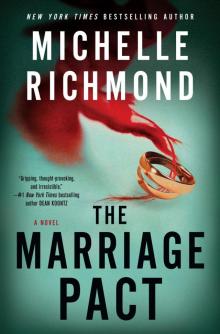 The Marriage Pact
The Marriage Pact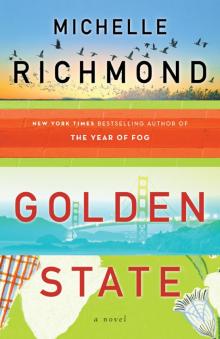 Golden State
Golden State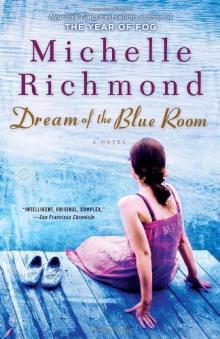 Dream of the Blue Room
Dream of the Blue Room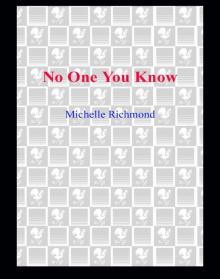 No One You Know
No One You Know